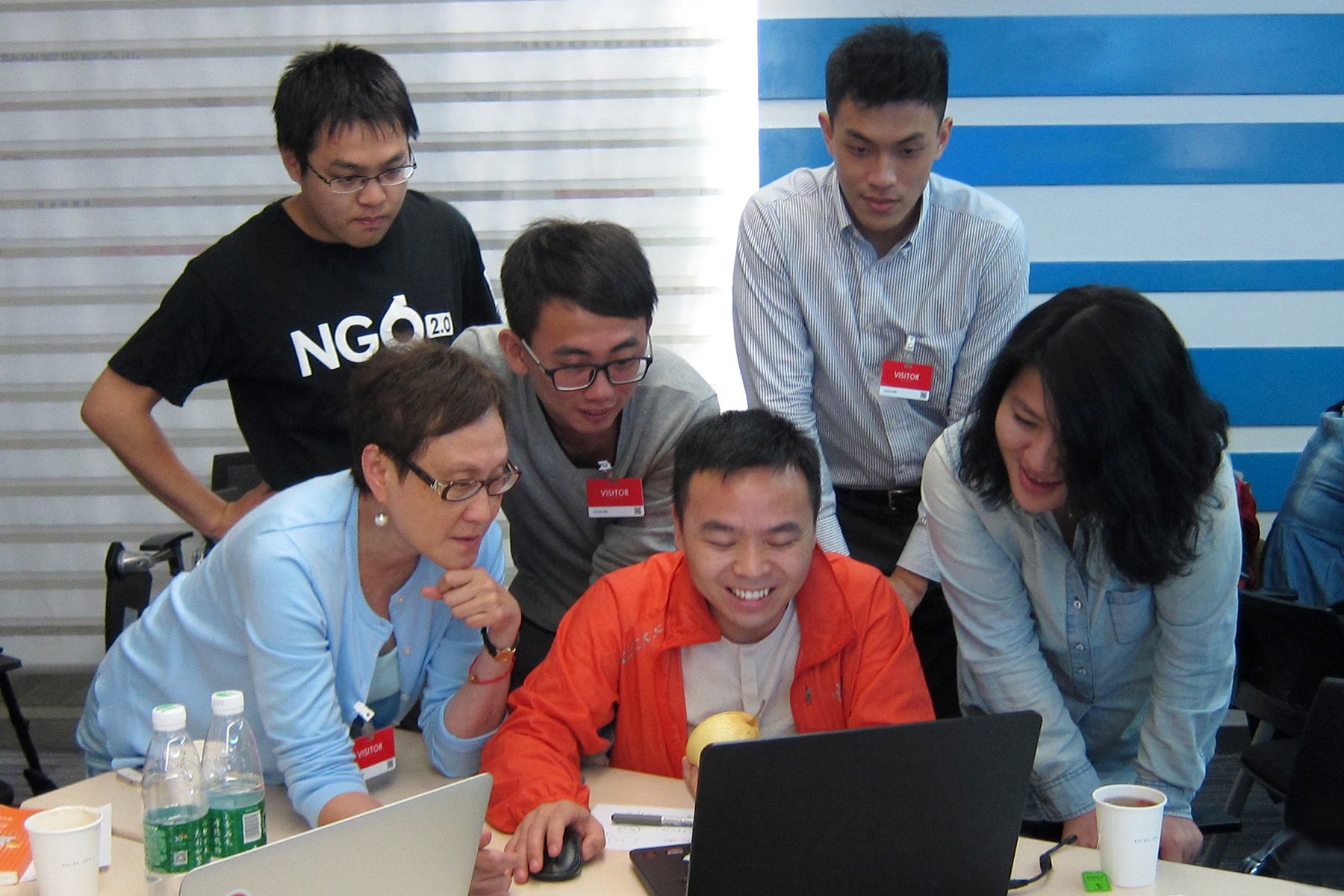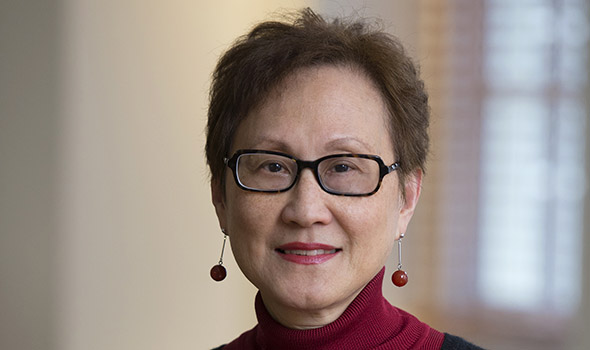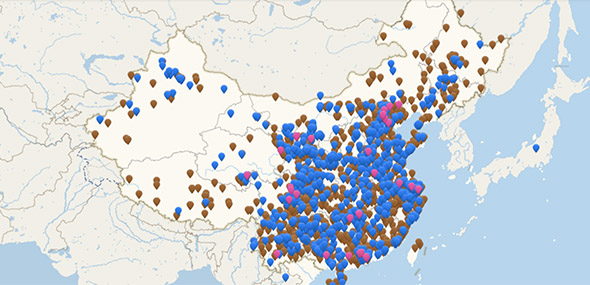Led by Jing Wang, the New Media Action Lab and NGO2.0 increase the impact of NGOs across China.
Cultural Studies scholar advances solutions to the digital divide.
 A civic hackathon held in collaboration with Tencent Cloud developers in Shenzhen, 2016. Left front: Professor Jing Wang left front; Left rear: Wang Yu, left rear, CMS/W alumnus, now at a Chinese maker company; along with four NGO leaders
A civic hackathon held in collaboration with Tencent Cloud developers in Shenzhen, 2016. Left front: Professor Jing Wang left front; Left rear: Wang Yu, left rear, CMS/W alumnus, now at a Chinese maker company; along with four NGO leaders
The New Media Action Lab bridges the digital gap to improve social welfare for underserved populations in rural and urban China.
"Mens et manus" is more than a slogan to MIT Professor Jing Wang. It's the reason she came to MIT 16 years ago. Already an accomplished scholar of Chinese cultural studies, Wang wanted to do more than think about problems; she wanted to help solve them.
Today, Wang is not only a professor with joint appointments in Global Languages and Comparative Media Studies. She is also the director of the MIT New Media Action Lab and the head of an influential nonprofit — NGO2.0 — that's working to bridge the digital divide, giving Chinese grassroots NGOs access to the vast resources provided by digital technology and social media practices.
"Coming to MIT opened a new page in my intellectual life," Wang says. "I felt I'd reached a ceiling as an academic intellectual, and I really wanted to see how I could also make a contribution beyond academia."
Advancing knowlege-sharing in underserved populations
Launched in 2009, NGO2.0 helps grassroots nongovernmental organizations (NGOs) throughout China employ digital and social media tools to collaborate with each other, create crowd-funding projects, and enhance the public’s awareness of the social causes they promote. "I was driven by the idea that social media could make an impact for the underprivileged in China, and I wanted to start the process with grassroots NGOs," Wang says.
Long involved with Creative Commons, a public knowledge-sharing platform, Wang recognized early on that while China had wired most of the country to the Internet by 2008, most NGOs — particularly those based in struggling rural areas — didn't know how to make constructive use of the new technology.
NGO2.0 was founded to bridge this gap. Funded by the Ford Foundation Beijing, and supported by MIT's Department of Global Studies & Languages, NGO2.0 began by providing social media literacy training. Today, the fifteen-person NGO2.0 team offers a wide range of information and communications technology training to grassroots NGOs throughout China.
NGO2.0 maintains a crowd-sourced map of philanthropic opportunities across China.
Over the years, NGO2.0 has become a significant player in the nonprofit sector in China — where it is an officially registered organization. Through key partnerships with IT corporations, universities, and city-based makers and software developers’ communities, NGO2.0 has trained over 800 organizations in a wide range of skills — from crisis management and communications strategy to project management and even video production. NGO2.0 also gives NGOs access to an online toolbox of digital resources, including “social media for social good” case studies, software tools, and recommendations.
In addition, NGO2.0 maintains a crowd-sourced map of philanthropic opportunities across China and will soon roll out an NGO Evaluation Databank — a matchmaking service that will make it easier for corporate social responsibility offices to identify worthwhile grassroots projects to support. "Because China is getting wealthier, people are thinking of giving back. There are change agents coming from different sectors to work together to produce social good," Wang says.
The challenge NGO2.0 is helping to meet is that larger philanthropic organizations in China tend to monopolize available resources. "We're seeing the emergence of elitism in the nonprofit sector. Our work of building the communication capacity of grassroots organizations will help China grow a more balanced ecology for the sector in the long run," she says.

Jing Wang, Professor of Chinese Media and Cultural Studies, and S.C. Fang Professor of Chinese Languages & Cultures
NGO2.0 is a significant player in the nonprofit sector in China. Through key partnerships with corporations, universities, city-based makers, and software developer communities, NGO2.0 has trained over 800 organizations in a wide range of skills — from crisis management and communications strategy to project management and video production.
Bringing discoveries home to MIT
Wang's work on NGO2.0 has also provided significant benefits back at MIT, where undergraduates use NGO2.0 case studies and data to examine the relationship between government and society in China. Over the years, two masters theses have emerged from the project, including one centered on the history of hacker and maker culture in China.
Wang herself has published both academic papers and a book related to the project — Social Media for Social Good: NGO2.0 Workshop Pedagogy (Publishing House of Electronics Industry, 2015). And, last year, she and her partners posted a massive open online course (MOOC) on crowd-funding to XuetangX, a Chinese MOOC platform associated with EdX. Wang's current book project, "Activism 2.0: The Other Digital China" (under contract with Harvard University Press) is also an outgrowth of her practical, hands-on experience with NGO2.0.
Overall, Wang's work with NGO2.0 reflects her view that her primary field — cultural studies — has moved far from its early substantive political, social, and material roots. "NGO2.0 represents the return of my critical practice to the empirical and the experiential, and a radical response I made to the ongoing crisis of cultural studies as a discipline," she wrote in the Chinese Journal of Communication in 2015.
Her work today reflects her belief, outlined in that same paper, that "the missing link of academic practice is not to reflect society in discourses, but to change it in practice."
Wang credits her background in cultural studies with providing her with the skills she has needed to run NGO2.0. "I'm not a techie, but designing a project requires the kind of critical thinking that cultural studies scholars are trained in, as well as the desire to help the underserved to have a voice," she says. "Cultural studies is deeply multidisciplinary."
Suggested links
In Memoriam | Jing Wang, 1950 - 2021
Remembrance at MIT News
Jing Wang, 1950 - 2021
Professor of Chinese Media and Cultural Studies, and the S.C. Fang Professor of Chinese Languages & Cultures
Profile at Global Languages
Profile at Comparative Media Studies
Global Languages
New Media Action Lab
Devoted to carrying out research initiatives in developing countries that are seeking solutions provided by new media and information technology to alleviate the symptoms of the digital divide.
NGO2.0
New media, new philanthropy
Story prepared by SHASS Communications
Editorial and Design Director: Emily Hiestand
Senior Writer: Kathryn O'Neill
Photographs: Courtesy of Jing Wang and NGO2.0
